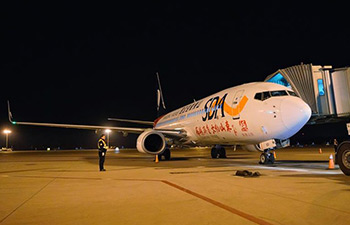LONDON, Dec. 4 (Xinhua) -- The number of children living in poverty in Britain has risen by nearly 25 percent in five years, according to new research released Tuesday.
Child poverty has risen continuously since 2011-12 with a total of 4.1 million children now living in poverty, an increase of 500,000 in the past five years, according to the Joseph Rowntree Foundation (JRF) annual Poverty Report.
The JRF, a leading social policy charity based in London, contains statistics for 2016-17 and found that a large majority of the increase in child poverty had taken place in families where at least one of the parents had a job.
Almost half of children living in poverty are in one-parent families, compared with just 25 percent of children in poverty living in families with two parents, and the rate of poverty for one-parent families has risen twice as fast as that for two-parent families.
While the proportion of children living in families where no-one works has fallen steadily, the risk of poverty for these families has increased significantly.
In 1996-7, 83 percent of children in workless families lived in poverty, and by 2012-13, the number had fallen to 63 percent, but since then the proportion has grown, with 73 percent of children in workless families now living in poverty.
Changes in the housing market have disproportionately affected low-income families with children.
Before the recession caused by the financial crisis, housing costs grew at similar rates across all income groups, and between 2007-08 and 2009-10, housing costs fell for families in all income groups, but by far more for those who were better off.
Since 2009-10, housing costs continued falling for families in the richest 60 percent of the population but started rising again for those in the poorest 40 percent, largely driven by increasing numbers of low-income families with children living in the private rental sector.
The increase in private sector renting is due to reduced access to social housing and drops in home ownership. The proportion of children in the poorest 20 percent living in the private rental sector rose from 17 percent in 2005-6 to 37 percent in 2016-17.
"We are seeing a rising tide of child poverty as more parents are unable to make ends meet, despite working," said Campbell Robb, JRF chief executive. "It means more families are trapped in impossible situations: struggling to pay the bills, put food on the table and dealing with the terrible stresses and strains poverty places on family life."
Twenty-two percent of the population in Britain, or 14.3 million people, are living in poverty, the report found, despite there being a record number of jobs in the economy and with unemployment levels at lows not seen for 45 years.
"Rising employment alone is not delivering lower poverty -- rather, in-work poverty is increasing faster than employment," the report found.













